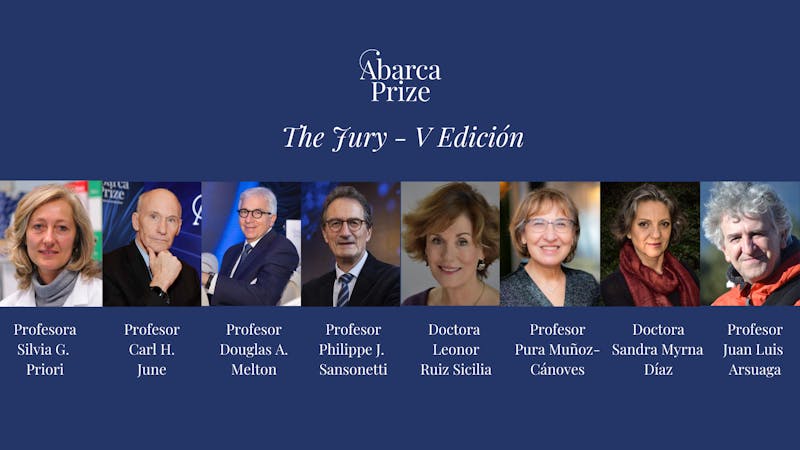The Dr Juan Abarca International Prize in Medical Sciences ABARCA PRIZE’ officially presents its jury, composed of a panel of scientific figures with widespread recognition both within and beyond our borders, who will decide the winner of the fifth edition of this award. This year, the jury welcomes Dr Leonor Ruiz Sicilia and the winner of the fourth edition, Dr Carl H. June. They join the continuing members: Professors Silvia Priori (jury president), Douglas Melton, Philipe Sansonetti, Pura Muñoz-Cánoves, Juan Luis Arsuaga, and Dr Sandra Myrna Diaz.
This fifth edition of ABARCA PRIZE marks a milestone in the award’s consolidation and long-term vision, reinforcing its national and international standing as a benchmark for supporting and rewarding translational research in healthcare.
The nomination process is open and will close on 30 May. This prize, already considered one of the most significant in the Spanish and continental scientific landscape, is endowed with €100,000 and a commemorative diploma. It recognises an individual in the field of research and Science from anywhere in the world whose work has made a transformative contribution to improving the health of individuals and populations.
The verdict of the ABARCA PRIZE jury for its fifth edition, chaired by Prof. Priori, will be announced in the first week of October.
Members of the ABARCA PRIZE Jury for its 5th Edition
Professor Silvia G. Priori – Jury President
A cardiologist and researcher, Prof. Priori has combined clinical practice with basic and translational research. In Italy, she works in the Department of Molecular Medicine at the University of Pavia and at the ICS Maugeri Hospital.
Since 2012, Priori has served as Scientific Director of the ICS Maugeri network, comprising 15 hospitals. She has also held several roles in scientific societies: as a member of the Board of Trustees of the Heart Rhythm Society (USA); a Member of the Board of the European Society of Cardiology, and President of the European Heart Rhythm Society.
Dr Priori has dedicated her clinical and research work to understanding the molecular mechanisms behind hereditary arrhythmias and, since 2013, has focused on developing molecular therapies to address these conditions.
She has been a jury member for ABARCA PRIZE in all four previous editions.
Dr Carl H. June – Winner of the 4th Edition of ABARCA PRIZE
Dr Carl H. June is the Richard W. Vague Professor in Immunotherapy at the Perelman School of Medicine, University of Pennsylvania, and Director of the Parker Institute for Cancer Immunotherapy at the same institution. Dr June joins this jury as the winner of the fourth edition of ABARCA PRIZE for his pioneering research and development of the revolutionary CAR-T (Chimeric Antigen Receptor) cell therapy strategy to treat blood cancers—considered one of the most significant medical-scientific advances of our time, comparable to the discovery of antibiotics, chemotherapy, or genetic research.
Beyond this globally impactful breakthrough, his research continues with major clinical translation, as scientists now work to apply this treatment to other solid tumours, autoimmune diseases (such as lupus), and many other non-oncological conditions.
Professor Douglas A. Melton – Winner of the 3rd Edition of ABARCA PRIZE
Co-Director of the Harvard Stem Cell Institute, Investigator at the Howard Hughes Medical Institute, and Distinguished Scientist at Vertex Pharmaceuticals, Prof. Douglas Melton won the third edition of ABARCA PRIZE for his advances in finding a cure for type 1 diabetes. Melton pioneered converting stem cells into insulin-producing beta cells, which could enable cell replacement therapy for type 1 diabetes.
Currently, Melton and his team are collaborating with pharmaceutical companies on multiple clinical trials to advance cell therapy as a new treatment for type 1 diabetes. His studies on patients who received transplanted pancreatic islet cells alongside immunosuppressants have yielded remarkable results, with some patients achieving temporary “cures” for several months.
Professor Philippe J. Sansonetti – Winner of the 2nd Edition of ABARCA PRIZE
Prof. Philippe Sansonetti, MD, trained in infectious diseases in Paris and bacterial genetics at the Pasteur Institute, followed by a postdoctoral fellowship at the Walter Reed Army Institute of Research. He is now an Emeritus Professor at the Pasteur Institute and the Collège de France, where he lectured for 12 years on the interface between basic microbiology and emerging infectious diseases.
He pioneered the field of Cellular Microbiology by deciphering the molecular and cellular mechanisms of Shigella pathogenesis. He recently applied similar approaches to unravel symbiotic mechanisms between the host and gut microbiota. His work on Shigella vaccine development and paediatric malnutrition linked to gut dysbiosis led him to address global health challenges in underdeveloped countries, particularly Africa.
Winner of the second edition of the ABARCA PRIZE, Philippe Sansonetti has received several prestigious awards, including the Louis Jeantet Prize for Medicine and the Grand Prix de l’INSERM. He is a member of the French Academy of Sciences and a foreign member of the US National Academy of Sciences, the Royal Society, and the German Leopoldina Academy.
Professor Pura Muñoz-Cánoves
A Pharmacy and Doctor of Biological Sciences graduate, Prof. Muñoz-Cánoves is a researcher at Altos Labs, San Diego Institute of Science (USA). Previously, she was Chair of Cell Biology at Pompeu Fabra University’s Department of Experimental and Health Sciences and a professor at the Catalan Institution for Research and Advanced Studies (ICREA), as well as a researcher at the National Cardiovascular Research Centre (CNIC) and CIBERNED.
After earning her PhD in 1990 from the Autonomous University of Madrid, she completed postdoctoral work at the University of California (San Diego). She led her research group in 1997 at the Barcelona Institute of Oncology Research (IRO) and joined the Centre for Genomic Regulation (CRG) in 2002. In 2009, she moved to Pompeu Fabra University as Chair of the Experimental and Health Sciences Department.
Her research on cellular ageing is particularly noteworthy. In 2019, she received the Rey Jaime I Prize for Medical Research and the Lilly Prize for Biomedical Research, and in 2021, the Santiago Ramón y Cajal National Research Prize in Biology.
Dr Sandra Myrna Diaz
A Senior Researcher at CONICET’s Multidisciplinary Institute of Plant Biology (IMBIV), Dr Sandra Diaz is a Community and Ecosystem Ecology professor at the National University of Córdoba and a Visiting Professor at the University of Oxford (UK). Diaz has played a pioneering role in the conceptual and methodological development of plant functional biodiversity, its responses to environmental change, and its ecosystem effects—first describing the global spectrum of plant form and function. For over a decade, she has combined this work with interdisciplinary studies on how different societal actors value biodiversity’s contributions and reconfigure biological communities and ecosystems.
She is a member of multiple science academies, including Argentina, the US, France, the Royal Society, and the American Philosophical Society. Her accolades include the Nobel Peace Prize (2007, shared with the IPCC), the Margalef Prize in Ecology (2017), the Gunnerus Prize in Sustainability Science (2019), the Princess of Asturias Award for Scientific and Technical Research (2019), the Frontiers of Knowledge Prize in Ecology and Conservation (2021), and the Tyler Prize for Environmental Achievement*(2025).
Professor Juan Luis Arsuaga
Juan Luis Arsuaga is a Spanish scientist, professor, and palaeontologist. A Doctor of Biological Sciences from the Complutense University of Madrid and Chair of Paleontology at the same university, he has been Scientific Director of the Museum of Human Evolution in Burgos since July 2013. He is a Visiting Professor at La Sapienza University in Rome.
Since 1982, he has been part of the research team at the Pleistocene sites of Atapuerca (Burgos), co-directing the team since 1991—a group awarded the Prince of Asturias Prize for Scientific and Technical Research and the Castilla y León Prize for Social Sciences and Humanities (both in 1997). He is the founder and lifetime Vice-President of the Atapuerca Foundation.
He is a member of the US National Academy of Sciences.
Dr Leonor Ruiz Sicilia
A Medicine graduate from the Autonomous University of Madrid (1983) and specialist in Psychiatry, Dr Ruiz Sicilia is a family therapist with a Master’s in Bioethics.
Throughout her career, she has held clinical, coordination, and leadership roles in various units of the public healthcare systems of Madrid, Granada, and Málaga. From 1999 until retirement, she worked at Málaga’s Hospital Virgen de la Victoria, where she headed the Systemic Family Therapy Unit and tutored the Multiprofessional Unit for medical, psychology, and nursing residents in Mental Health.
She has taught numerous courses in mental health, bioethics, and family therapy at public health and university institutions. She also chaired the Interdisciplinary Commission on Violence Against Women at the Hospital Universitario Virgen de la Victoria.
Dr Ruiz Sicilia has held various roles in Healthcare and Research Ethics Committees since 2005. She was Director of the Bioethics Strategy for Andalusia’s Public Health System and Vice-President of the Andalusian Bioethics Committee. Currently, she is a member of the Spanish Research Ethics Committee and, since 2018, the Spanish Bioethics Committee—serving as its President from 2022 to 2024.

